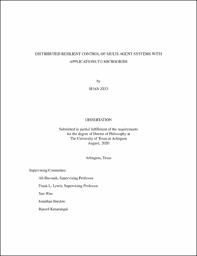
ATTENTION: The works hosted here are being migrated to a new repository that will consolidate resources, improve discoverability, and better show UTA's research impact on the global community. We will update authors as the migration progresses. Please see MavMatrix for more information.
Show simple item record
| dc.contributor.advisor | Davoudi, Ali | |
| dc.contributor.advisor | Lewis, Frank | |
| dc.creator | Zuo, Shan | |
| dc.date.accessioned | 2020-09-10T18:25:37Z | |
| dc.date.available | 2020-09-10T18:25:37Z | |
| dc.date.created | 2020-08 | |
| dc.date.issued | 2020-08-03 | |
| dc.date.submitted | August 2020 | |
| dc.identifier.uri | http://hdl.handle.net/10106/29444 | |
| dc.description.abstract | Distributed cooperative control of multi-agent systems (MAS) has been an active research area over the last few decades. Distributed cooperative controller is locally designed using the neighborhood relative information. Such a distributed control manner, however, is vulnerable to malicious attacks, due to the absence of a centralized control architecture to effectively monitor and verify the local information flow. Those attacks could undermine cooperative performance and even cause system instability. In this work, a new concept of multi-group system is first proposed, consisting of cooperative leaders and followers, as well as adversaries. A resilient control framework is developed for general linear heterogeneous MAS to counter sensor faults and adversaries' attacks by preserving the uniformly ultimately bounded (UUB) convergence for output containment performance. Then, attack-resilient control methods are developed for the secondary control level of AC and DC microgrids. In particular, fully distributed control protocols using observer-based techniques are proposed for the secondary frequency regulation and voltage containment of AC microgrids to address general unknown unbounded attacks. A fully distributed attack-resilient control framework using adaptive techniques is established for DC microgrids to mitigate the adverse effect of unbounded attacks on local control input channels. A two-layer hierarchy for networked MAS with two opposing teams is developed, including a control protagonist team with cooperative multi-inverter microgrids and an attack antagonist team with interacting attackers. A distributed control architecture, that is resilient to correlated sensor attacks and unbounded attacks on actuators and communication channels, is proposed. Finally, a distributed control framework using adaptive techniques is proposed for AC microgrids. Compared to the observer-based approach, this method does not need extra cyber layers for information exchange between observers, reducing computational complexity and system vulnerability against attacks. Moreover, the ultimate bound can be reduced by adjusting the tuning parameters. Extensive numerical simulations or hardware-in-the-loop studies validate the effectiveness of the proposed methods. | |
| dc.format.mimetype | application/pdf | |
| dc.language.iso | en_US | |
| dc.subject | Microgrids | |
| dc.subject | Multi-agent systems | |
| dc.subject | Resilient control | |
| dc.subject | Unbounded attacks | |
| dc.title | Distributed Resilient Control of Multi-agent Systems with Applications to Microgrids | |
| dc.type | Thesis | |
| dc.degree.department | Electrical Engineering | |
| dc.degree.name | Doctor of Philosophy in Electrical Engineering | |
| dc.date.updated | 2020-09-10T18:25:38Z | |
| thesis.degree.department | Electrical Engineering | |
| thesis.degree.grantor | The University of Texas at Arlington | |
| thesis.degree.level | Doctoral | |
| thesis.degree.name | Doctor of Philosophy in Electrical Engineering | |
| dc.type.material | text | |
Files in this item
- Name:
- ZUO-DISSERTATION-2020.pdf
- Size:
- 41.04Mb
- Format:
- PDF
This item appears in the following Collection(s)
Show simple item record


